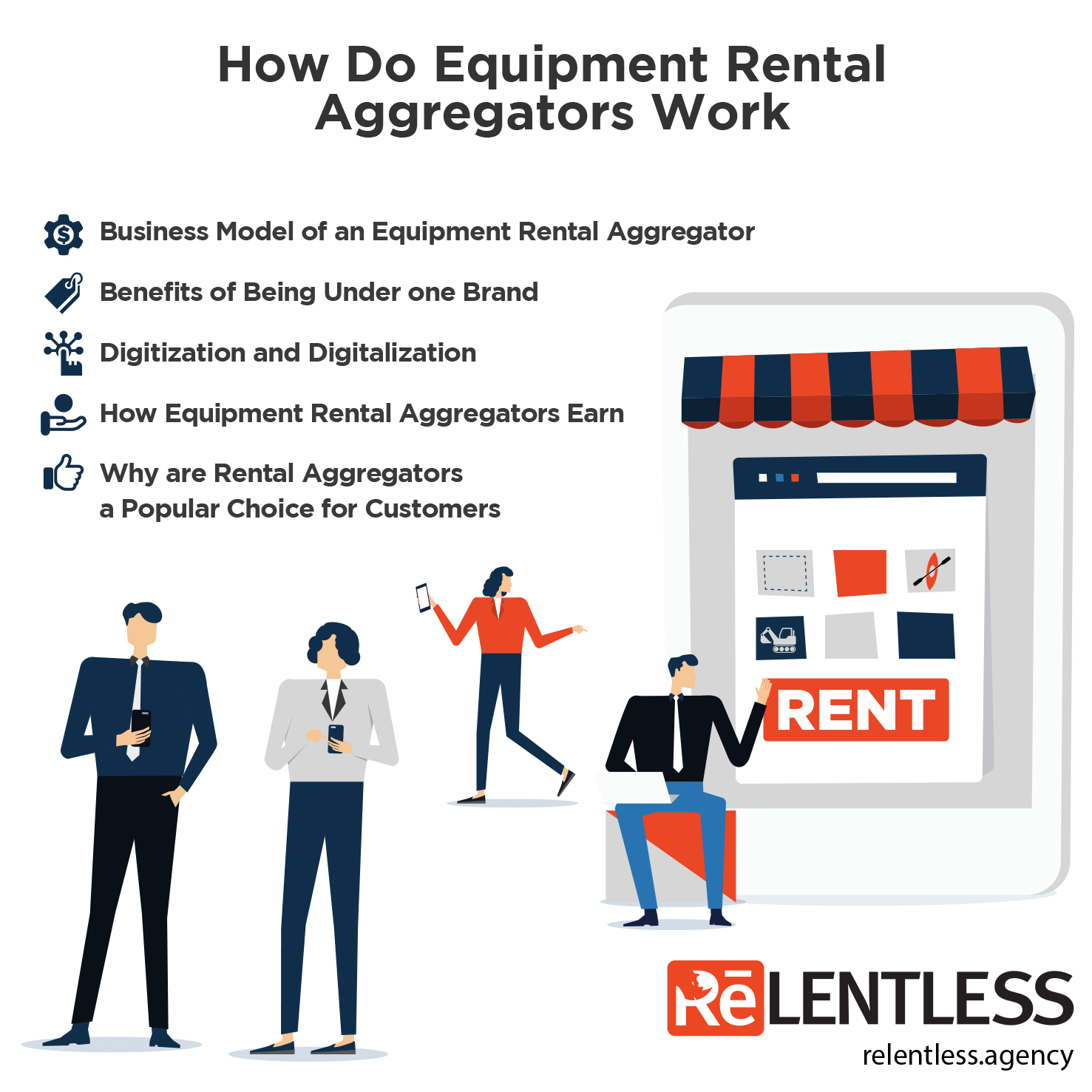The number of rental aggregators has been steadily increasing in popularity. Some people might not have noticed that they were even customers of these businesses such as Airbnb, booking.com, uber, etc. A rental aggregator is a company that collects information about rental service providers and invites them to become a partner under one brand. In return, they work hand in hand by enhancing the features, product quality, and brand awareness under one platform.

Equipment rental aggregators is a group under the aggregator business which is also rising in popularity. Heavy equipment, audio-visual equipment, and other equipment rental niches can be the next multi-million dollar company by creating an aggregator platform.
Business Model of an Equipment Rental Aggregator
At its most basic, the business model of an equipment rental aggregator is pretty straightforward; aggregators connect those looking for equipment to those who supply it for rent. They provide access to a platform, usually a website or an app, where these two can meet and do their transactions.

There are three popular types of platforms for equipment rental aggregators:
- A decentralized platform is where product owners can set the price and terms for renting a product. The platform owner allows the product owner to list, and customers can freely view and transact with them within the platform.
- A centralized platform is where the platform owns the products and sets the price or terms.
- A hybrid model is where the product and platform owner agrees on a contract. In this case, the platform owner decides the rental price and terms. The ownership and risk are decentralized; on the other hand, the service quality and standardization are centralized.
Within these three types of platforms, the primary focus of the aggregator is to connect customers and suppliers, then simplify their transactions.
Benefits of Being Under one Brand
As a supplier of equipment for rent, having an aggregator as a partner can be beneficial due to their extensive network. Aggregators are usually well-versed in community building and marketing, which will be valuable to their partnered rental equipment suppliers.
With a suitable business model, it has been unequivocally proven that aggregators can bring various benefits to the rental industry for customers and service providers. They can provide genuine competitive tension and inform customer decisions.

One value-added benefit of partnering up with an equipment rental aggregator is that a supplier can reduce barriers to entry, minimizing their marketing costs and gaining more visibility. The supplier can focus on equipment maintenance and improving their service or product quality. In contrast, aggregators heavily focus on marketing by building traffic toward their platform, which is their key to earning profit.
Being under one brand often relates to being a part of something bigger. Equipment rental aggregators empower the industry by creating a fleet of big and small equipment rental suppliers. On the other hand, customers are given a better way to access different equipment rental products and services.
Digitization and Digitalization
Digitization and digitalization have been deemed a top priority for the rental industry, and it is clear that digital transformation is no longer optional but necessary in today’s world. It addresses many challenges that hinder the industry from reaching its full potential.
One of the reasons why a rental supplier would form a partnership with rental aggregators is their capability and expertise in digitalization. Some rental suppliers are often limited to having their clients visit their brick-and-mortar shops to avail of their services. Rental aggregators invest in software that helps their partners and customers easily transact through their platform.
Often, digitalization happens by creating an eCommerce-powered platform via the web or a mobile application. Suppliers and customers can create their profiles through this platform and use them when doing business.
How Equipment Rental Aggregators Earn

An aspiring equipment rental aggregator must have considered many things, including how to make a profit in this field. The most straightforward answer would be that equipment rental aggregators earn commissions for every rental sale. However, before making commissions and scaling their business, the theoretical explanation for the necessary steps an aggregator needs to take would be the following:
- Aggregators source out and visit rental service providers.
- Aggregator promises them more customers and proposes a partnership contract.
- The aggregator builds up a brand and attracts customers through many marketing strategies.
- A customer acquires a rental service through the aggregator’s platform.
- Partners get more customers as promised.
- The aggregator receives a commission through every rental sale.
Why are Rental Aggregators a Popular Choice for Customers?
A simple answer for this would be that they are the one-stop shop for everything in their niche. For example, suppose an equipment rental aggregators niche involves audio-visual equipment. In that case, customers can find all types of audio-visual equipment from different rental suppliers through their platform. Rental aggregators significantly reduce consumer research time by providing many options through a platform accessible via a computer or mobile device. A customer also benefits from the following through a rental aggregator:
Competitive Pricing
An aggregator would discuss with their suppliers about pricing mechanics. The main goal is to have more customers for their suppliers, and to do so, competitive pricing is one of the critical factors to consider.
A Safer Choice
Having someone in between the supplier and customer has its perks. Rental aggregators would have an agreement with the suppliers regarding product and service quality. Because of this, first-time customers will likely be at ease when renting through a rental aggregator platform.
Centralized Authority

A centralized authority is advantageous for customers and suppliers as they have a mediator for disputes. Aggregators also ensure that they apply rules and regulations when using their platform, making it more organized for everyone involved.
Access to Reviews and Recommendations

It has been a practice that whenever you rent a product or service online, you must check the reviews and recommendations. Having all suppliers in one platform can make it easier for the clients to compare and share their experiences. Customers make informed decisions by reading reviews and recommendations. At the same time, suppliers often provide the best service they can offer to satisfy the customer and acquire a good reputation on the platform.
